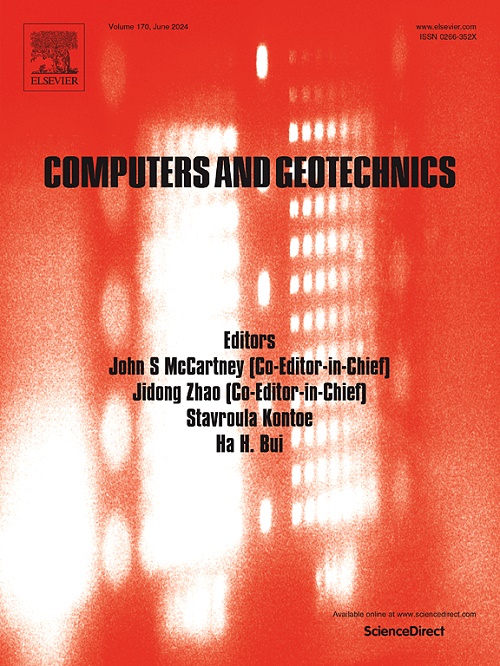Ground-boundary scatter method for wavefield analysis of layered sites with single-faced arbitrarily stepped topographies
IF 5.3
1区 工程技术
Q1 COMPUTER SCIENCE, INTERDISCIPLINARY APPLICATIONS
引用次数: 0
Abstract
This study proposes a ground-boundary scatter method for calculating wavefields in layered sites with stepped topographies. The total wavefield is decomposed into the free field of the flat site and the reflected wavefield from the ground. The wave-reflection equivalent forces are calculated through a dynamic analysis of the ground-boundary substructure intercepted from a full-domain site model. In the scattering analysis, a scaling-line-based scaled boundary finite-element method in the time domain is developed for the high-accuracy simulations of semi-infinity in an asymmetric layered half-space. A domain reduction method based on accurate wavefield solutions is used to analyze the soil–structure interaction. The proposed method makes complex topography-dependent wavefield calculations more flexible and practical, thus overcoming the limitations of traditional methods for seismic input. It can be used for localized arbitrarily shaped stepped topographies based on near-field finite-element models, thereby satisfying engineering requirements. The detailed implementation steps are described. For validation, numerical examples of wave propagation are for in homogeneous and layered stepped half-space containing valleys and irregular stepped terrains under different plane-wave incidence directions. The engineering applicability of this method is benchmarked through the seismic analyses of a nuclear structure built on different single-faced stepped-topography sites, revealing its potential adverse effects on structural response.
用于分析具有单面任意阶梯地形的层状场地波场的地界散射法
本研究提出了一种地面边界散射法,用于计算具有阶梯状地形的层状场地的波场。总波场分解为平坦场地的自由场和来自地面的反射波场。波反射等效应力是通过对从全域场地模型中截取的地面边界子结构进行动态分析计算得出的。在散射分析中,开发了一种基于缩放线的时域缩放边界有限元方法,用于非对称分层半空间中半无限的高精度模拟。基于精确波场解的域缩减方法用于分析土壤-结构相互作用。所提出的方法使复杂的与地形相关的波场计算更加灵活实用,从而克服了传统地震输入方法的局限性。它可用于基于近场有限元模型的局部任意形状的阶梯状地形,从而满足工程要求。本文介绍了详细的实施步骤。为了验证其有效性,在不同平面波入射方向下,对包含山谷和不规则阶梯地形的均质和分层阶梯半空间进行了波传播数值示例。通过对建在不同单面阶梯状地形上的核结构进行地震分析,揭示了该方法对结构响应的潜在不利影响,从而确定了该方法在工程上的适用性。
本文章由计算机程序翻译,如有差异,请以英文原文为准。
求助全文
约1分钟内获得全文
求助全文
来源期刊

Computers and Geotechnics
地学-地球科学综合
CiteScore
9.10
自引率
15.10%
发文量
438
审稿时长
45 days
期刊介绍:
The use of computers is firmly established in geotechnical engineering and continues to grow rapidly in both engineering practice and academe. The development of advanced numerical techniques and constitutive modeling, in conjunction with rapid developments in computer hardware, enables problems to be tackled that were unthinkable even a few years ago. Computers and Geotechnics provides an up-to-date reference for engineers and researchers engaged in computer aided analysis and research in geotechnical engineering. The journal is intended for an expeditious dissemination of advanced computer applications across a broad range of geotechnical topics. Contributions on advances in numerical algorithms, computer implementation of new constitutive models and probabilistic methods are especially encouraged.
 求助内容:
求助内容: 应助结果提醒方式:
应助结果提醒方式:


